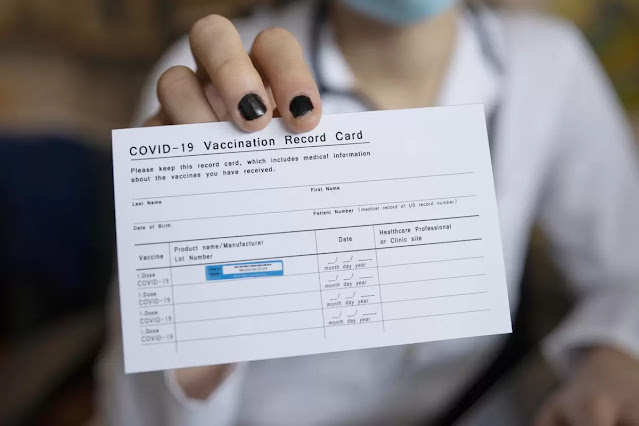The development of three COVID-19 vaccines is the best hope for ending the ongoing pandemic. As the number of vaccine doses continues to rise and more Americans are eligible it is important to debunk some of the ongoing myths about the vaccine. Unfortunately, there is much false information being spread about vaccines, especially via social media. Here we look at the top six myths about the COVID-19 vaccinations and the truths surrounding them.
1. MYTH: Getting the COVID-19 vaccine will give you COVID.
FACT: Pfizer and Moderna’s vaccine utilize messenger RNA (mRNA) to deliver the COVID vaccine. mRNA vaccines work by encoding a portion of the spike protein from on the surface of SARS-CoV-2. This is the virus that causes COVID-19. Johnson & Johnson utilizes a different technology to deliver the COVID-19 to individuals. Johnson & Johnson vaccine uses a “shell of a virus”, in this case, adenovirus, to carry genetic material into the cells. The adenovirus, a type of virus that causes the common cold, is inactivated and carries the genetic material into the human cells. The human cells then produce coronavirus proteins to mimic the virus and this helps your immune system fight off potential infection at a later time.
2. MYTH: The COVID-19 vaccine will alter my DNA.
FACT: Johnson & Johnson’s vaccine is made using adenovirus which is a different transport system than Pfizer and Moderna. The use of mRNA does enter into the human cells but not the nucleus where DNA is stored. The purpose of the mRNA is to cause the human cell to make a protein that will stimulate your immune system to fight coronavirus. Your body then breaks down the mRNA, affecting your DNA.
3. MYTH: If I’ve already had COVID-19, I don’t need a vaccine.
FACT: Healthcare officials recommend receiving the vaccine even if you have already been infected with COVID-19. While current research indicates that COVID antibodies are in your system for 90 days, there is simply not enough research to determine how long you are truly protected after an infection. While rare, it is possible to be reinfected with the virus which in most cases has led to more severe complications including death.
The CDC recommends if you were treated for COVID-19 with monoclonal antibodies or convalescent plasma, you should wait 90 days before getting a COVID-19 vaccine. If you are unsure if you were treated with these medical interventions, speak to your healthcare provider to determine vaccine eligibility.
4. MYTH: Getting the COVID-19 vaccine means I can stop wearing my mask and taking other coronavirus precautions.
FACT: Vaccines do not prevent you from getting coronavirus. They prevent you from developing a moderate or severe case of the virus. It is extremely important that even after becoming fully vaccinated to continue to wear a mask, social distance, avoid crowds, and remain at least six feet apart.
With that being said, the CDC has released new guidelines for individuals who are fully vaccinated. This means you are at least two weeks post-vaccine (second dose if you received Pfizer or Moderna). Again, these new guidelines are only for fully vaccinated individuals are include the following:
◉ You can gather indoors with fully vaccinated people without wearing a mask.
◉ You can gather indoors with unvaccinated people from one other household (for example, visiting with relatives who all live together) without masks unless any of those people or anyone they live with has an increased risk for severe illness from COVID-19.
◉ If you’ve been around someone who has COVID-19, you do not need to stay away from others or get tested unless you have symptoms.
5. MYTH: The development of the COVID-19 vaccine was very rushed, so its effectiveness and safety should not be trusted.
FACT: Yes, the development of the COVID vaccines was very quick, they have a 67%-95% effectiveness with no reported deaths during the clinical trials. The vaccines were developed using technology that has been utilized to make other vaccines including mRNA and the use of adenovirus. Because of the severity of the virus and the global impact especially on the economy, pharmaceutical companies stopped a lot of ongoing research to focus solely on the development of a COVID vaccine. Finding participants for the clinical trials was easy because of social media and the general public desire to end the ongoing pandemic. Finally, the vaccine developers did not have to raise funds for the vaccine as governments helped fund the vaccine development and pre-ordered vaccine doses including payment. This money was then used to research and conduct vaccine trials.
6. Myth: I have food allergies, including an egg allergy, so I shouldn't get the COVID-19 vaccine
FACT: The Pfizer, Moderna, and Johnson & Johnson COVID-19 vaccines do not contain eggs nor were eggs used during the development or production of the vaccines. Furthermore, there is no other food that was utilized in the virus. It is recommended by the CDC for those with severe allergic reactions to eggs or any other substance (i.e., anaphylaxis) to remain after vaccination for 30 minutes for observation.
Ultimately, getting the COVID-19 vaccine is a personal decision; however, multiple healthcare officials and medical professionals continue to suggest that without creating herd immunity and a majority of the population becoming vaccinated - it will take a much longer time to return to normalcy.
Source: nurse.org






